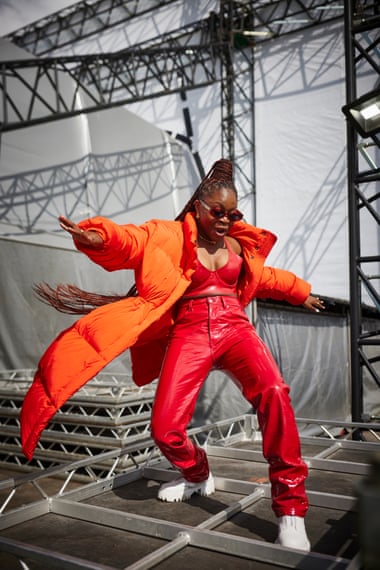Before she relocated to Zambia during the pandemic, Sampa Tembo (AKA Sampa the Great) had a message for the Australian music industry: “I’ve seen the industry scheme, and it’s a killer; I’ve seen the industry kill the dreams of a dreamer.” Time’s Up was a scathing manifesto that Tembo unleashed on her critically acclaimed debut album, The Return. From there she was named Double J’s artist of the year in 2019, took home four Aria awards and won the coveted Australian music prize twice.
Yet there was a dissonance between these accolades and the industry’s treatment of Tembo – most publicly at the 2019 Aria awards when she became the first woman of colour to win best hip-hop release (for Final Form), only for her acceptance speech about race and diversity to be cut from the live broadcast. To quote from Time’s Up, “Fuck the Aria.” (Aria CEO Dan Rosen apologised for the mistake and on behalf of the organisation promised to do better.)
Now, three years later she’s back with her sophomore record, As Above So Below, a fervent celebration of her return to Zambia and a continuation of her journey to make peace with herself. On The Return, Tembo was riddled with doubt and struggled to reconcile feelings of displacement, but her latest album is a triumphant homecoming underscored by empowerment, joy and an overwhelming sense of freedom.

Tied together by a desire for authenticity and marked by a ferocious culmination of frustration and self-actualisation, As Above So Below is Tembo’s most cohesive body of work yet. Recorded in just two weeks, Tembo enlisted legendary Zambian producer Mag44 – who she calls “our very own African Timbaland” – and co-produced for the first time. Aside from the record being a love letter to herself, she also pays tribute to her roots, from a homage to Zamrock and lyrics in the Bantu language to an impressive list of African collaborators who help tell her story. Nothing is lost in translation in this homegrown production. The result is a revelatory performance.
As the album plays, an intense driving force moves each song forward as the rapper ruminates on the multitude of ways to show up as a Black woman in an industry that wants her to do anything but. Tembo is accordingly defiant, refusing to loosen her grip.
“I can be hard, I can be soft, I can be everything under the stars,” she chants on Shadows, punctuated by glittering marimbas. Wryly she beckons naysayers to feast their eyes on her transformation into Eve.
Eve was first introduced to us on Final Form (“Last name Tembo, first name Eve”) and is what the rapper describes in interviews as a “mentality” (rather than a persona). It’s Tembo at her most confident and fully-realised; steeped in divine femininity, luxuriating in her sexuality and draped in high fashion. Over 11 songs, Eve is rarely called out by name but her presence is felt throughout.
Teaming up with Denzel Curry on Lane, Tembo boasts and pokes at her haters (“I ain’t underrated, I’m just under hate”), which she continues on the tongue-in-cheek pop anthem, IDGAF. “I think it’s beneath me now, I ain’t even tripping (no more, no more, no more) I don’t give a – .” Lead single Never Forget sees Tembo joined by Zambian R&B singer Tio Nason (who sings in Chewa), rapper Chef 187 and her sister Mwanjé, who cement Africa’s undeniable stamp on culture and history. “Who took fabric, made that shit classic? That shit ain’t average, we did!” Oozing with loud, unmerciful confidence, Tembo is hypnotically – and joyfully – feeling herself.
When it comes to her performance, Tembo’s poetic rhetoric is as witty as it is scathing, her voice sharp as it is mellifluous. She wields it like a weapon on Bona, as she unleashes bars like: “They been acting they can’t see us win, I believe they can’t ignore us.” On IDGAF, she dips into a simmering, whispery lilt for the refrain before returning to her signature acerbic growl on Can I Live, featuring legendary Zamrock band Witch, to deliver a veritable middle finger to her naysayers.
Continuing to say the quiet parts loud, Tembo interrogates censorship, industry gatekeepers and the expectations of Black artists to put on a happy facade. “They want us to hush, that’s why they got us masked up,” Joey Bada$$ bellows on Mask On.
The underlying thesis of As Above So Below is the revolutionary act of self-love, which is distilled in Let Me Be Great, featuring the Beninese singer Angeliqué Kidjo. A bright tangle of horns and soaring vocals from Kidjo is an emotional, full-circle moment teeming with mutual respect from one start to another. Let Me Be Great is as much a self-affirmation as it is a threat: Tembo is no longer answering to the cavalcade of the Australian industry. She isn’t just great, she’s unstoppable.
Stay connected with us on social media platform for instant update click here to join our Twitter, & Facebook
We are now on Telegram. Click here to join our channel (@TechiUpdate) and stay updated with the latest Technology headlines.
For all the latest Music News Click Here
